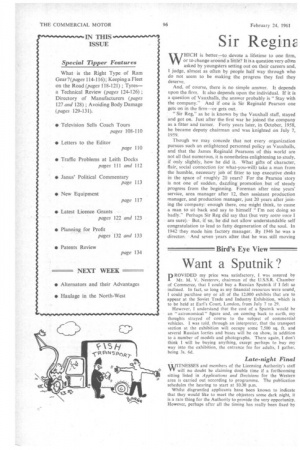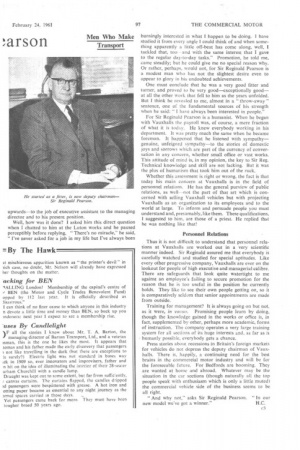Sir Regine arson
Page 48

Page 49

If you've noticed an error in this article please click here to report it so we can fix it.
Men Who Make Transport
WHICH is better to devote a lifetime to one firm, or to change around a little? It is a question very often asked by youngsters setting out on their careers and, I judge, almost as often by people half way through who do not seem to be making the progress they feel they deserve.
And, of course, there is no simple answer. It depends upon the firm. It also depends upon the individual. If it is a question of Vauxhalls, the answer probably is "Stay with the company." And if one is Sir Reginald Pearson one gets on in the firm—or gets out.
"Sir Reg," as he is known by the Vauxhall staff, stayed and got on. Just after the first war he joined the company as a fitter and turner. Forty years later, in October, 1958, he became deputy chairman and was knighted on July 7, 1959.
Though we may concede that not every organization pursues such an enlightened personnel policy as Vauxhalls, and that the James Reginald Pearsons of this world are not all that numerous, it is nonetheless enlightening to study, if only slightly, how he did it. What gifts of character, flair, social connection (or what-you-will) take a man from the humble, necessary job of fitter to top executive desks in the space of roughly 20 years? For the Pearson story is not one of sudden, dazzling promotion but of steady progress from the beginning. Foreman after nine years' service, area manager after 12, then assistant production manager, and production manager, just 20 years after joining the company: enough there, one might think, to cause a man to sit back and say to himself "I'm not doing so badly." Perhaps Sir Reg did say that (but very sotto voce 1 am sure): But, if so, he did not 'allow understandable self congratulation to lead to fatty degeneration of the soul. In 1942 they made him factory manager. By 1946 he was a director, And seven years after that he was still moving
upwards—to the job of executive assistant to the managing director and to his present position.
Well, how was it done? I asked him this direct question when I chatted to him at the Luton works and he paused perceptibly before replying, "There's no miracle," he said, " I've never asked for a job in my life but I've always been
burningly interested in what I happen to be doing. I have studied it from every angle I could think of and when something apparently a little off-beat has come along, well, I tackled that, too .and with the same interest that I gave to the regular day-to-day tasks." Promotion, he told me, came steadily; but he could give me no special reason why. Or rather, perhaps, would not, for Sir Reginald Pearson is a modest man who has not the slightest desire even to appear to glory in his undoubted achievements.
One must conclude that he was a very good fitter and turner, and proved to be very good—exceptionally good— at all the other work that fell to him as the years unfolded. But I think he revealed to me, almost in a " throw-away " sentence, one of the fundamental sources of his strength when he said; " I have always been interested in people," For Sir Reginald Pearson is a humanist. When he began with Vauxhalls the payroll was, of course, a mere fraction of what it is today. He knew everybody working in his department. It was pretty much the same when he became foreman. It happened that he listened with sympathy— genuine, unfeigned sympathy—to the stories of domestic JOYS and sorrows which are part of the currency of conversation in any concern, whether small office or vast works. This attitude of mind is, in my opinion, the key to Sir Reg. Technical knowledge and skill are not lacking. But it was the plus of humanism that took him out of the ruck.
Whether this assessment is right or wrong, the fact is that today his main concern at Vauxhalls is in the field of personnel relations. He has the general purview of public relations, as well—not the part of that art which is concerned with selling Vauxhall vehicles but with projecting Vauxhalls as an organization to its employees and to the world at large. To inform and persuade people you must understand and, presumably, like them, These qualifications, I suggested to him, are those of a priest. He replied that he was nothing like that Personnel Relations
Thus it is not difficult to understand that personnel rela
tions at Vauxhalls are worked out in a very scientific manner indeed. Sir Reginald assured me that everybody is carefully watched and studied for special aptitudes. Like every other progressive company, Vauxhalls are ever on the lookout for people of high executive and managerial calibre. There are safeguards that look quite watertight to me against an employee's failing to secure promotion for the reason that he is too useful in the position he currently holds, They like to see their own people getting on, so it is comparatively seldom that senior appointments are made from outside.
Training for management? It is always going on but not.
as it were, in vocao. Promising people learn by doing, though the knowledge gained in the works or office is, in fact, supplemented by other, perhaps more academic, forms of instruction. The company operates a very large training system for all sections of its huge interests and, as far as is humanly possible, everybody gets a chance.
Press stories about recessions in Britain's foreign markets for vehicles do not depress the deputy chairman of Vauxhalls. There is, happily, a continuing need for the best brains in the commercial motor industry and will be for the foreseeable future. For Bedfords are booming. They are wanted at home and abroad. Whatever may be the situation in the car sections (though naturally all the top people speak with enthusiasm which is only a little muted) the commercial vehicle side of the business seems to be all right.
"And why not," asks Sir Reginald Pearson, " In our new model we've got a winner." H.C.




































































































































































